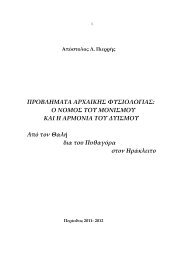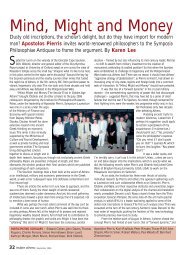APPENDIX C΄ ON DEPILATION: BODY COSMETICS IN CLASSICAL ...
APPENDIX C΄ ON DEPILATION: BODY COSMETICS IN CLASSICAL ...
APPENDIX C΄ ON DEPILATION: BODY COSMETICS IN CLASSICAL ...
You also want an ePaper? Increase the reach of your titles
YUMPU automatically turns print PDFs into web optimized ePapers that Google loves.
544 <strong>APPENDIX</strong> <strong>C΄</strong><br />
Firstly, then, to have the pubic hair removed was practised by men,<br />
too, and this even in early times. The connotation is again of<br />
wantonness and lewd abandon to sexual pleasures. See Aristophanes,<br />
Nubes, 977-8: äÏ›ʷÙÔ ‰’ iÓ ÙÔéÌÊ·ÏÔÜ Ôé‰Âd˜ apple·Ö˜ ñapple¤ÓÂÚıÂÓ /<br />
ÙfiÙ’ ôÓ, œÛÙ / ÙÔÖ˜ ·å‰Ô›ÔÈÛÈ ‰ÚfiÛÔ˜ ηd ¯ÓÔܘ œÛappleÂÚ Ì‹ÏÔÈÛÈ<br />
âapple‹ÓıÂÈØ where the contrast implies the opposite practice in<br />
Aristophanes’ time among boys. (The above- mentioned connotation<br />
is testified by the context of the passage). This is, however, a general<br />
statement, applicable to all boys and not especially to those<br />
particularly prone to pleasure (äÏ›ʷÙÔ rather indicates gymnastic<br />
exercises), and perhaps simply explainable by the repugnance which<br />
ancient Greeks felt to exist between beauty, either in young woman or<br />
young man, and hairiness in any part of the body other than the skull<br />
(compare, e.g. for women, the descriptions of the lowermost part of<br />
the female trunk in Rufinus’ epigrams, Anth. Graeca Book V, 35 and<br />
36, implying as they do, immaculate hairlessness); though, even so,<br />
the change of habits as reported by Aristophanes must be significant.<br />
But we may add another conclusive testimony from Menander’s<br />
\OÚÁ‹ apud Athenaeus IV 166A (Fr. I, Meineke IV p. 178): ηd<br />
‚¿„ÔÌ·È, / ηd apple·Ú·ÙÈÏÔÜÌ·È Óc ¢›·, ηd ÁÂÓ‹ÛÔÌ·È / KÙ‹ÛÈappleappleÔ˜,<br />
ÔéÎ ôÓıÚˆappleÔ˜, âÓ çÏ›Áˇˆ ¯ÚfiÓˇˆ - where even the rest of the fragment,<br />
and, besides, what Athenaeus relates about Ctesippus, the son of the<br />
famous general Chabrias, make it clear that we have here to do with<br />
àÛˆÙ›· and ì‰˘apple¿ıÂÈ· in men.<br />
It is instructive here to compare the same Aristophanian sentiment<br />
as is found in Lucian, Cynicus §14. It is once more about the<br />
perennial theme of the good old days when morality prevailed. The<br />
men of old were real men, and they could move without shoes and<br />
without clothes (the modern equivalent of Lucian would not, though,<br />
praise nakedness equally fervently, I suppose!), and they wore the hair<br />
and beard that God bestowed on them as an ornament, like the mane<br />
of lions and horses. They were better than us, and no one of them<br />
would suffer to be shaved no less than any lion would suffer this.<br />
ñÁÚfiÙËÙ· ÁaÚ Î·d ÏÂÈfiÙËÙ· Û·ÚÎe˜ Á˘Ó·ÈÍd appleÚ¤appleÂÈÓ ìÁÔÜÓÙÔ, ·éÙÔd<br />
‰’ œÛappleÂÚ qÛ·Ó, ηd Ê·›ÓÂÛı·È ôÓ‰Ú˜ õıÂÏÔÓ! ñÁÚfiÙ˘ (limpid<br />
liquidity, this indefinable quality of moist voluptuousness which, for<br />
the ancients, could characterise a body and a form of life, a glance and<br />
a style) and smoothness are, as always, the signs of a body, and a<br />
temperament, luxuriating in sensual gratification. And Lucian ends










